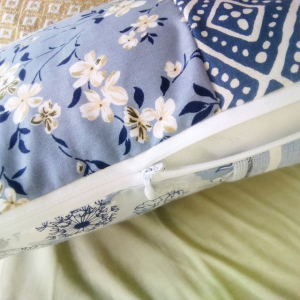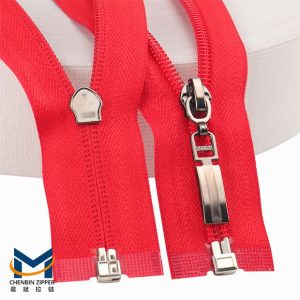Understanding Continuous Zipper Construction
Basics of Continuous Zippers
Definition and Functionality
A continuous zipper referred to as a long chain zipper, serves as a versatile fastening mechanism available in bulk without pre-attached stops or sliders. This configuration permits manufacturers to cut the zipper to any required length, making it suitable for diverse applications. It ensures a seamless closure throughout its entire length, thereby enhancing functionality and adaptability for various project needs.
Common Uses in Various Industries
The continuous zipper is widely used across multiple sectors, from clothing and accessories to home décor and industrial applications. It is highly favored in the fashion industry for garments like dresses, jackets, and jeans. In-home textiles, it is employed in items such as bedding, pillows, and cushions. Additionally, it finds extensive use in manufacturing bags, luggage, and even tents and sleeping bags, showcasing its broad utility and functionality.
Differences from Standard Zippers
Structural Variations
Continuous zippers differ structurally from standard zippers in that they do not come prefabricated with specific lengths or fixed-terminations. This construction allows significant flexibility as the user can determine the length and apply the necessary sliders and stops based on specific project needs. These custom zippers are completely different from standard zippers, which are typically available in fixed lengths and configurations.
Performance Characteristics
The performance of a continuous zipper varies depending on the materials used in its construction. These zippers provide a smooth and efficient closure mechanism, with flexibility being a crucial attribute. They also allow for the creation of extended zipper lengths without compromising functionality, making them ideal for large applications such as tents or industrial covers.
Exploring Various Materials in Continuous Zipper Manufacturing
Metal Zippers
Aluminum
Properties and Benefits
Aluminum zippers present a lightweight alternative with outstanding corrosion resistance, making them ideal for items exposed to damp conditions. They operate effortlessly, increasing user convenience, and possess the durability to endure regular usage, ensuring they last in multiple applications.
Common Applications
Aluminum zippers are commonly used in fashion items like dresses and skirts where a lightweight yet durable solution is required. They also find usage in accessories such as purses and bags, where a balance between strength and weight is critical.
Brass
Advantages and Limitations
Brass zippers are known for their strength and durability, offering a robust closure solution. However, they are heavier than their aluminum counterparts and might require more maintenance to prevent tarnishing. Despite these limitations, they provide a reliable fastening option.
Industrial Uses
Brass zippers are extensively used in heavy-duty applications such as jeans, work-wear, and outdoor gear. Their rugged nature makes them ideal for products that are subject to high levels of stress and strain, like backpacks and camping equipment. In this case, we also need to choose the right zipper accessories to fit the functional requirements of the zipper.
Plastic Zippers
Polyester
Durability and Flexibility
Polyester zippers, typically constructed from nylon, are appreciated for their robust durability and flexibility. They can adapt to a wide range of shapes without losing their strength, making them perfect for items that necessitate frequent opening and closing.
Typical Uses
These zippers are widely used in clothing, especially jackets and sportswear, due to their lightweight properties and resilience. They are also popular in home textiles such as cushions and bedding, providing a reliable yet non-intrusive closure mechanism.
Nylon
Strengths and Weaknesses
Nylon zippers are renowned for their strength and smooth operation, offering excellent performance in a variety of conditions. However, they may not be as aesthetically pleasing as metal options and can sometimes lack the same level of durability under extreme usage.
Situational Applications
Nylon zippers are fantastic for applications requiring a balance between strength and flexibility, such as luggage, backpacks, and shoes. Their ability to withstand stress while maintaining smooth operation makes them a go-to choice for both light and heavy-duty products.
Composite Materials
Combination of Different Elements
Hybrid Properties
Composite zippers are crafted by combining different materials to maximize their advantages. These hybrid zippers can provide improved visual appeal, greater durability, and unique features such as waterproofing or fire resistance. By integrating various materials, it is possible to create zippers that meet specific requirements.
Usage Scenarios
Zippers made from composite materials are used in specialized applications where standard zippers may fall short. For instance, waterproof zippers are essential for outdoor gear and marine equipment, while fire-resistant zippers are crucial in firefighting gear and other safety apparel. By combining materials, composite zippers provide unique solutions tailored to meet specific demands in various industries. Companies like Chenbin Zipper exemplify this diversity, providing high-quality zippers suitable for numerous industries and specific needs.
In summary, the continuous zipper is a versatile and essential component in numerous industries, with its flexibility and adaptability enhanced by the use of different materials. Whether it’s for a lightweight garment or a heavy-duty industrial cover, continuous zippers offer a customization and durable fastening solution.
Impact of Material Choice on Zipper Performance
Durability and Longevity
The durability and longevity of a continuous zipper depend significantly on the different materials used in its construction. For instance, metal zippers, such as those made from brass or aluminum, are known for their robustness and ability to withstand high levels of wear and tear. These attributes make them ideal for heavy-duty applications like workwear, outdoor gear, and luggage. On the other hand, plastic zippers—particularly those made from high-quality nylon—also offer impressive durability. Despite being lightweight, they provide strong resistance against daily wear, making them perfect for items requiring frequent use, such as clothing and home textiles. For tasks that need outstanding durability, companies such as Chenbin Zipper maintain stringent quality checks from the yarns to the sliders, making sure every part helps in creating a robust final product.
Flexibility and Ease of Use
When selecting materials for continuous zippers, flexibility and ease of use are crucial factors. Nylon and polyester zippers are known for their high flexibility, enabling them to smoothly contour around curves and edges. This quality is especially advantageous in fashion design and home décor projects. The flexibility of these zippers makes them suitable for a variety of applications, ranging from lightweight garments to intricate upholstery work. Although metal zippers are generally less flexible than plastic ones, they provide a tactile and sturdy feel that enhances the user experience in specific applications such as bags and jackets.
Environmental Factors
Weather Resistance
Weather resistance is a key factor in determining the optimal material for a continuous zipper. In environments where exposure to moisture, extreme temperatures, or UV rays is a concern, certain materials outperform others. Nylon zippers, for instance, often feature excellent resistance to water and sunlight, making them suitable for outdoor apparel like raincoats and tents. Aluminum and brass zippers also offer good resistance to corrosion, which is essential for marine applications and other settings with high humidity. Effective weather resistance ensures that the zippers maintain their functionality and appearance over time, regardless of environmental conditions. Waterproof zippers, a specialty offering from Chenbin Zipper, add another layer of environmental protection, making them ideal for applications requiring water resistance, such as rainwear and marine equipment.
Chemical Exposure Tolerance
Chemical exposure tolerance significantly affects the choice of materials for continuous zippers used in specialized industries. Some materials, like certain types of nylon and polyester, can withstand chemical exposure without degrading, making them ideal for applications in medical or industrial products where exposure to chemicals and cleaning agents is frequent. Metal zippers, particularly those made from resistant alloys, can also perform well under chemical exposure, but they may require additional coatings or treatments to maintain their integrity. Understanding the specific environmental conditions and chemical exposures the zipper will endure helps in selecting materials that ensure long-term performance and reliability. Companies like Chenbin Zipper offer an extensive selection of high-quality zippers, guaranteeing that whether you require strength, flexibility, or resistance to environmental factors, there is a continuous zipper available to satisfy your needs.
By understanding the interplay between different materials and the specific requirements of their application, manufacturers and designers can make informed decisions to optimize the performance, durability, and versatility of continuous zippers across a plethora of industries and uses. At the same time, it is also necessary to further provide customers with optimal solutions for cut-to-length zippers.
Evaluating Material Selection for Specific Needs
Consumer Products: Apparel and Accessories
When assessing material choices for continuous zippers in consumer products like apparel and accessories, it is crucial to balance practical requirements with aesthetic appeal. Clothing items, especially fast-fashion garments such as dresses and skirts, benefit greatly from materials that are both lightweight and durable. Nylon zippers, renowned for their flexibility and smooth functionality, are ideally suited for these applications. They integrate seamlessly with the fabric, offering a discreet yet effective closure. Chenbin Zipper, a leading supplier in this domain, offers a variety of such zippers tailored to fit these consumer needs.
Bags and purses, often subjected to frequent opening and closing, require zippers that can withstand constant use without degrading. In such scenarios, polyester zippers are often preferred due to their durability and ability to endure stress. They also offer a variety of color options, allowing designers to match the zipper to the bag’s aesthetic perfectly. On the other hand, brass zippers, with their unique metallic finish, add a touch of luxury and serve both functional and decorative purposes in high-end fashion accessories.
Heavy-Duty Applications: Luggage and Outdoor Gear
In the realm of heavy-duty applications, including luggage and outdoor gear, the choice of materials for continuous zippers becomes even more critical. This equipment demands zippers that can handle substantial wear and tear while maintaining a smooth and reliable closure. Metal zippers, particularly those made from brass or stainless steel, provide the necessary strength and durability for these high-stress applications. Additionally, Chenbin Zipper’s range of waterproof and reflective zippers offers specialized functionality for outdoor enthusiasts and professionals who require equipment that can withstand harsh conditions.
For outdoor gear, where exposure to various environmental conditions like rain, humidity, and sun is common, nylon zippers with weather-resistant coatings are a practical choice. These zippers can endure the harsh elements without corroding or losing functionality. Additionally, composite zippers, which integrate materials like waterproof or fire-resistant coatings, offer specialized solutions for extreme conditions. They are invaluable in outdoor gear and industrial applications, where standard zippers would not suffice.
Specialized Uses: Medical Equipment and Protective Gear
Specialized applications, such as medical equipment and protective gear, necessitate careful material selection for continuous zippers. In medical settings, zippers must endure frequent sterilization processes and exposure to different chemicals without losing their integrity. Therefore, nylon and polyester zippers are commonly used due to their chemical resistance and easy-to-clean properties.
Protective gear, including items like firefighting suits and hazardous material containment suits, necessitates the use of zippers with exceptional durability and safety features. Fire-resistant zippers made from special composite materials can endure high temperatures and ensure the safety of the user. Additionally, waterproof zippers are essential in protective gear designed for use in wet or hazardous environments, ensuring that the interior remains dry and protected from external moisture or contaminants. Chenbin Zipper provides specialty zippers like fireproof and waterproof variants, guaranteeing that the zippers function effectively under severe conditions.
Altogether, understanding the specific needs and environmental conditions of each application allows for the optimal selection of materials in continuous zippers. Whether for everyday clothing or highly specialized protective gear, continuous zippers made from different materials provide tailored solutions that enhance performance and reliability.












